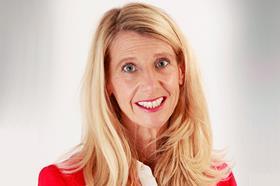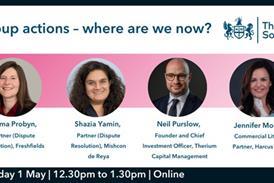We ask Kelda Groves about her career, her experience of moving from private to in-house practice, and developments within the area of group litigation

What was your first job?
As a 16-year-old desperate for cash, I had two first jobs – on the checkout at Woolworths, and home baking profiteroles and personalised birthday cakes.
While I much preferred the baking, it was a lot less lucrative at first, given my novice pricing errors (I simply doubled the cost of the ingredients). I learnt the value of a business manager early, as I did much better sending my Dad round to deliver the cakes and re-negotiate a better price!
What are the current challenges in your area of specialism?
My specialist area is class actions or group litigation, with a focus on competition and consumer claims.
This is a developing area, where there are different regimes and procedural mechanisms depending on the type of claim, and where the practical application and approach to case management by the courts of these new regimes is key.
Parties have had to press ahead with these high value, high volume claims without the benefit of clear and definitive guidance from the courts.
Given the high stakes, the first decisions have gone all the way up to the Supreme Court, creating a bottleneck for other claims.
We have only recently received guidance in the antitrust arena on the test for certification of opt-out claims in Merricks, with the Mastercard decision, and there are a number of cases that have been heard where the judgments are imminent.
Do you have a career highlight / lowlight?
I was called in by Volvo to help build their defence to the Trucks litigation – one of the largest and most complicated follow-on claims, where the truck manufacturers were defending thousands of claims across Europe.
I was embedded in the defence team, working alongside external counsel, seeking to coordinate the defence work to a multiplicity of claims across a variety of jurisdictions, dealing with some group or collective actions (UK, Germany, and the Netherlands) in addition to the myriad of individual claims.
This required me getting up to speed on the procedure and practice of different jurisdictions, although earlier experience had given me a head start (I’d previously managed European litigation for Credit Suisse (CS) and worked in Paris). This required a step change in terms of really understanding not just the different rules, but also the judicial approach that would be taken on the key issue of quantification of loss.
For instance, I learnt that a full trial in Spain can be completed in less time than an English disclosure application, and the impact this shorter timescale has on the presentation of arguments and evidence.
I also had to consider the complexity of formulating a defence strategy that accommodates defending collective actions moving at a sedate pace, at the same time as individual actions.
I enjoyed the intellectual complexity of the issues raised and being at the heart of a multi-cultural, cross-jurisdictional team.
Tell us about your experience switching from private to in-house practice.
As part of the banking litigation group at Allen & Overy, I worked on a number of matters for CS, including both litigation and regulatory investigations. As a result, when CS’s head of litigation left, it was the natural choice to go on secondment there. It was a very gentle transition, working for a familiar client and still with the support of the ‘mother ship’.
I loved the lack of hierarchy that came with being in-house, and the focus on substance over appearance. Suddenly, the usual qualifying labels of ‘partner’, or ‘junior associate’, and questions about number of years’ experience, were no longer relevant.
The only question that I was asked – and that mattered – was: “Do you know the answer? Can you help?” This was both refreshing and terrifying.
I also noticed the change of focus. When in-house, legal arguments were but one part of the picture, and the best answers always needed to take account of a range of business imperatives. As a litigator used to ‘winning an argument’, this forced me to widen my perspective, and encouraged my creativity.
This could, however, be frustrating at times, as the in-house litigator wasn’t always physically around to be a valuable driving force when business objectives were set.
My most recent move has been back into private practice, to Hagens Berman, a dedicated and experienced class action claimant firm. I am enjoying being able to focus on legal arguments, the rights and wrongs of a matter, and getting results and returning real value to our consumer clients.
What trends are you noticing in your line of work? How are you responding to them?
A greater use of technology in case preparation and hearings, both in the UK and abroad. In the last tumultuous 18 months, barriers have been smashed through, and reluctance to change has been overcome.
There had already been some movement in this direction, notably in arbitration, but now technology has become a fully integrated reality throughout my line of work, and lawyers and judges have surprised themselves at how much time and money can be saved.
What do you know now that you wish you’d known when you started out in law?
As everyone eventually discovers, ‘the perfect’ is the enemy of ‘the very good’. Clients are looking for practical solutions at a reasonable cost. Some of my best meetings have been with clients who jump at the chance to achieve a quick and effective outcome rather than heavenly perfection!
What are you working on at the moment?
I’m currently working on UK consumer and competition mass claims against large corporates, focussing on mass emissions litigation against Mercedes.
I’m also exploring other opportunities in Europe, seeking to leverage Hagen Berman’s class action expertise, and my own European experience, to take advantage of the developing mass consumer action landscape and the opportunities for expanding access to consumer justice across Europe.
Tell us an interesting fact about yourself.
I’ve travelled to over 120 countries, nearly all of them with my three children and husband. There is no common theme to the places visited (although my now teenage children moan that ‘lack of adequate broadband’ might provide the missing link!).
I’ve enjoyed the beautiful beaches of Sierra Leone, riding a donkey up to the Citadel in Haiti, and marvelling at Isfahan’s architectural wonders in Iran.
Share some great advice you’ve been given.
Hope for everything, expect nothing, and take what comes. In other words, remain eternally hopeful and positive about the future, but with low expectations, and the resilience and flexibility to accept and deal with what actually happens.















